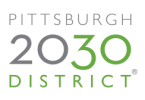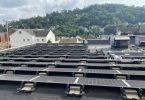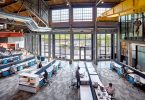Zaheen Hussain’s unique worldview ultimately led him to be among the leaders for sustainability in the Pittsburgh-area Borough of Millvale.

Hussain at a Millvale EcoDistrict Planning Meeting, where the community can provide input on Millvale’s sustainable planning
Born in Bangladesh, Hussain immigrated to the United States when he was eight-years-old. With the “good fortune of having experienced life in different parts of the world,” Hussain developed a deep-seated interest in learning as much as he could about how most things in the world are connected. His interest in sustainability grew from there, according to Hussain, “I feel as though it’s a field that also works to view the world holistically, and address its issues as such.”
Here in Pittsburgh, Hussain is leading the charge for sustainability and equity in Millvale. Prior to Millvale, he worked at GTECH strategies as the project manager, leading the ReEnergize Pittsburgh Coalition to strengthen residential energy efficiency through collaboration and community-level advocacy. He has taken those skills of community building to Millvale, where he works with the Millvale Community Library and the Millvale EcoDistrict Collaborative. He is a shared community resource to advance the EcoDistrict goals of food, water, energy, mobility, air quality, and equity.
In Millvale, he has been a part of a team that helped the borough to become the first in the Commonwealth of Pennsylvania to achieve a platinum sustainability rating through the Sustainable Pennsylvania Community Certification Program, while also winning the American Planning Association Planning Excellence Award (Pennsylvania Chapter) for the Millvale EcoDistrict Pivot Plan.
Currently, Hussain believes that “the discrepancy in socio-economic equity throughout the city is incredibly troubling. I think that has a lot to do with old habits in development. What I’m inspired by however is the strong vocal opposition and leadership to drive the community development world towards greater equity, incorporating the needs of disadvantaged communities. Is it perfect yet? No. Are there people who are working to improve the system? Yes!”
He envisions a more inclusive Pittsburgh in the future, one where innovation and sustainability work together to increase the quality of life. This will come through continuing to welcome national and international talent through the universities as well as through community-driven education and place-making. Hussain sees a Pittsburgh where “we can invest in infrastructure to reverse the negative impacts on our public and environmental health.”









